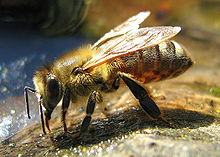- Apiology
-
Part of a series on Zoology 
Branches Anthropology · Anthrozoology · Apiology
Arachnology · Arthropodology · Cetology
Conchology · Entomology · Ethology
Helminthology · Herpetology · Ichthyology
Malacology · Mammalogy · Myrmecology
Nematology · Neuroethology · Ornithology
Paleozoology · Planktology · Primatology
ZoosemioticsNotable zoologists Karl Ernst von Baer · Georges Cuvier
Charles Darwin · Jean-Henri Fabre
William Kirby · Carolus Linnaeus
Konrad Lorenz · Thomas Say
Jakob von Uexküll · Alfred Russel Wallace
more...History Pre-Darwin · Post-Darwin Apiology (from Latin apis, "bee", and Greek -λογία, -logia) is the scientific study of honey bees, a subdiscipline of melittology, which is itself a branch of entomology. Honey bees are often chosen as a study group to answer questions on the evolution of social systems.
Contents
Related terms
Melittology is the study of all bees, which comprise more than 17,000 species other than honey bees. Apicology is honey bee ecology. Apidology is a variant spelling of apiology used outside of the Western Hemisphere, primarily in Europe; it is sometimes used interchangeably with melittology.
List of notable Apiologists
- Charles Butler, (1560-1647), early English beekeeper and researcher.
- Charles Dadant, (1817-1902), Modernized beekeeping.
- Jan Dzierzon, (1811-1906), Discovered parthenogenesis among bees, proposed first sex determining mechanism for any species.
- Savannah Foley, studies genetics and communication over long distances at the University of Southern Florida, leading a team investigating recent dropping numbers of honey bees.[citation needed]
- Karl von Frisch, (1886-1982), Nobel Prize winner, studied honey bee communication.
- Robert A. Holekamp, (1848-1922), Early urban apiculturalist and advocate
- Jay Hosler, Professor at Juniata College, Author of the award-winning comic Clan Apis.
- Karl Kehrle (aka "Brother Adam") (1898-1996), Benedictine monk, beekeeper, and an authority on bee breeding, developer of the Buckfast bee.
- Warwick Estevam Kerr, (b.1922), Studies genetics and sex determination in honey bees. Responsible for introduction of Africanized bees to America.
- William Kirby, (1759-1850), Author of the first scientific treatise on English bees.
- L. L. Langstroth, (1810-1895), Modernized American beekeeping.
- Martin Lindauer, (1918-2008), studied communication systems in various species of social bees including stingless bees and honey bees.
- Sir John Lubbock (the 1st Lord and Baron Avebury) (1834–1913), wrote on hymenoptera sense organs.
- Robert E. Page, Jr., Studies population genetics and the evolution of complex social behavior at Arizona State University.[1]
- Petro Prokopovych, (1775–1850), Ukrainian beekeeper, founder of commercial beekeeping.
- Moses Quinby, (1810-1875), Early American commercial beekeeper. Invented modern bee smoker.
- Gene E. Robinson, Studies mechanisms of behavior at the University of Illinois.[2]
- Amos Ives Root (1839 – 1923), Innovator in honey harvesting techniques. Published first account of Wright brothers flight in his beekeeping journal.
- Justin O. Schmidt, Studies bee nutrition, chemical communication, physiology, ecology and behavior. Created Schmidt Sting Pain Index.
- Thomas D. Seeley, Studies group organization using the honey bee as a model system at Cornell University.[3]
- Robert Evans Snodgrass, (1875-1962), Author of one of the first comprehensive books on honey bee anatomy and physiology.
- Stephen Taber III, (1924-2008), Innovator in the practice of artificial insemination of queen bees for the purpose of developing disease resistant and gentle bee colonies.
- Mark Winston, Studies life history, caste structure, and reproduction in social insects and pheromones of honey bees at Simon Fraser University.[4]
See also
- Bee
- Honey bee
- Beekeeping
- Entomology
- Ecological importance of bees
- Melissopalynology
References

This bee-related article is a stub. You can help Wikipedia by expanding it.
